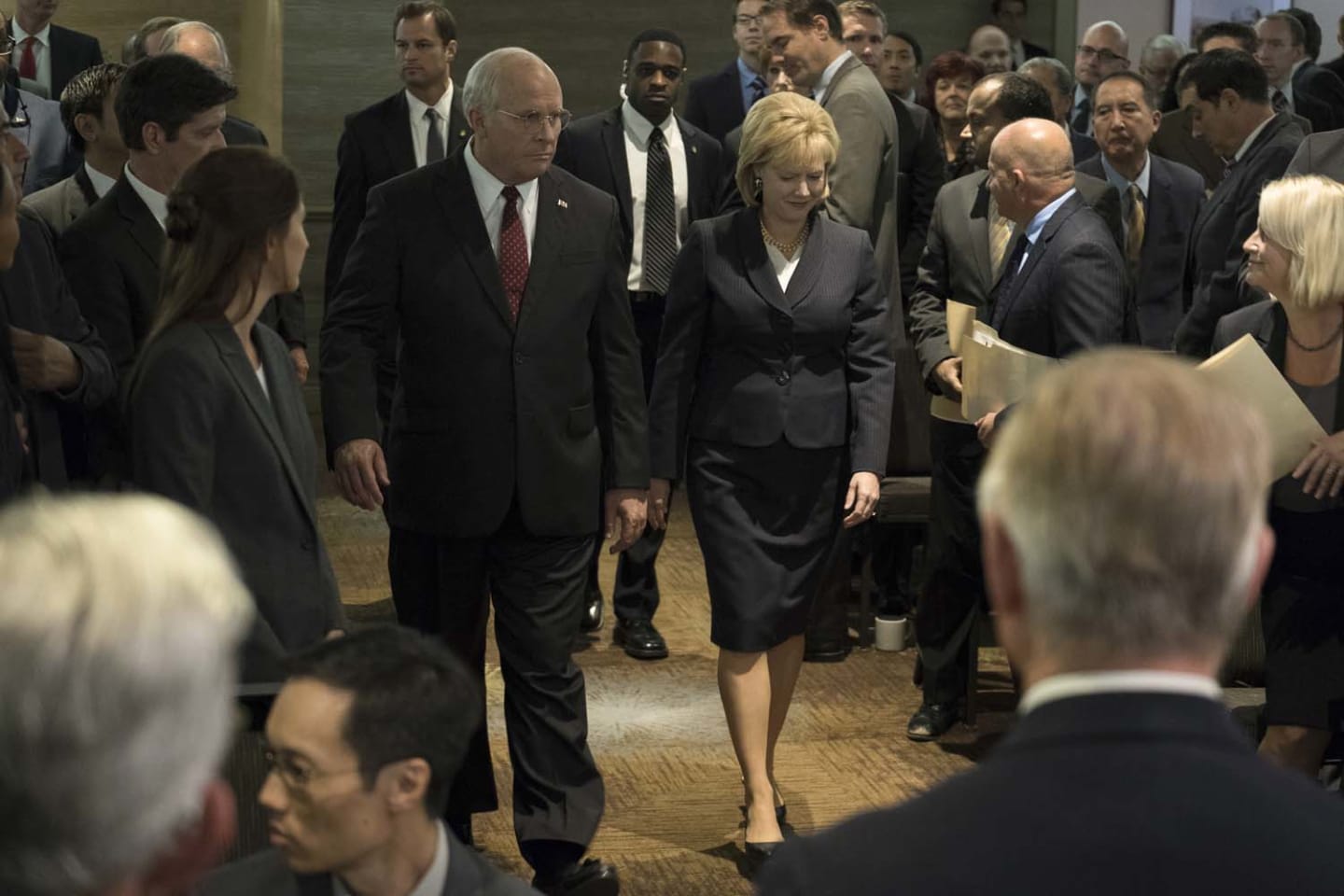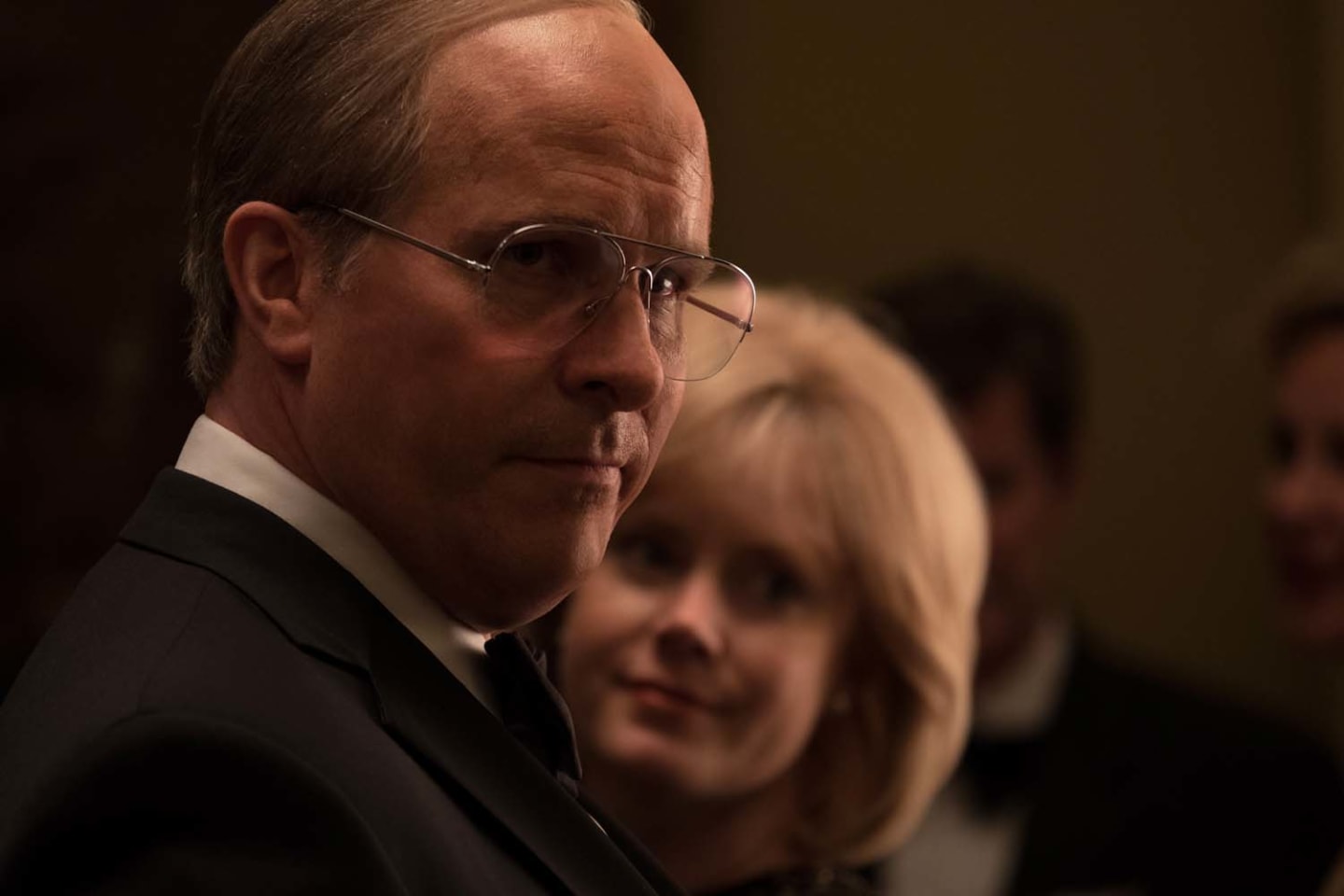Vice has generated a number of Oscars nominations, including a Best Picture nod, along with a Best Director nomination for Adam McKay and acting nominations for Christian Bale, Amy Adams, and Sam Rockwell. Yet even with all those accolades, Vice is proving one of the most divisive films of this year’s Academy Awards nominees. Chronicling the life of one of America’s most controversial public figures in former Vice President Dick Cheney, played with startling accuracy by an eerily transformative Christian Bale, is going to ruffle some feathers on either side of the political divide. It is not a feel-good story. It is not an aspirational true story. More so than being a simple biography, Vice is the story of the last 40 years of the conservative movement told through a single man’s life, and how over those four decades these men were able to completely reshape the playing field of American politics.
The opening narration from Jesse Plemons’ character establishes McKay’s thesis succinctly: “As the world becomes more and more confusing, we tend to focus on the things that are right there in front of us. While ignoring the massive forces that actually change and shape our lives.”
This Isn’t Your Conventional Biopic
As he did in his 2015 Oscar-winning film The Big Short, Adam McKay uses Vice to ask one simple question: How in the hell did we get here? The Big Short has characters break the fourth wall to bluntly explain the seemingly complex machinations behind the 2008 financial collapse. With Vice, though, it’s a more difficult task because most people watching were alive and politically active in the run up to the Iraq War in 2003 and various controversies of the George W. Bush years. This has led to many critics understandably writing off Vice as smug and condescending, tackling a well-worn topic and operating without any poetic grace or subtlety. But Vice isn’t a movie aiming for political nuance or even attempting to change any minds.
Instead, McKay sees a nation in the grip of sickness and the only way to truly understand the illness is to rip out the rotted-out heart beneath the surface. It’s easy to conclude that the rotten heart is Cheney himself. However, Cheney is just a symptom of a larger illness, which comes in the form an insular political movement not defined by ideology but a raw hunger for power.
An array of techniques pull back the curtain on the massive forces that have changed and shaped American life. There are the fourth wall breaks, an unconventional narrator, and a timeline that moves blisteringly fast through recent American history. Moments such as an unexpected end credits sequence midway through the movie or a brazen Shakespearian soliloquy keep the movie full of offbeat humor to help counteract any feelings of helplessness or despair as the film goes through the Machiavellian maneuvers of the infamous VP.
Nixon, Watergate, And The Power of Secrecy
Dick Cheney enters the insulated world of conservative politics in 1968, just as Richard Nixon takes the White House after a campaign that played upon culture war divisions. Cheney begins to work for the cantankerous and contentious congressman Donald Rumsfeld (played by Steve Carell). Here the future vice president will get a crash course in realpolitik, punctuated by the moment he asks Rumsfeld, “What do we believe?” The naïve question is answered with uproarious laughter.
The biggest lesson learned for Cheney during the Nixon years was the power of secrecy. Rumsfeld gives Cheney a little bit of inside baseball, alerting his underling to a secret meeting between Richard Nixon and Henry Kissinger in Kissinger’s office where the two discuss the expansion of the Vietnam War to Cambodia with a secret and illegal bombing campaign. These meetings and the topics discussed were not part of official records keeping. This would inform Cheney’s later operations as he oversaw various counter-terrorism operations (such as the enhanced interrogation techniques, a.k.a. torture) or meetings with industry leaders and lobbyists, all matters he liked to handle without any scrutiny.
When Nixon falls amidst the Watergate scandal, Cheney sees where the disgraced president erred. It wasn’t the rampant criminality. It wasn’t the coverups. It was, as Bale’s Cheney bluntly says in the film, “Nixon forgot the voice-activated recorders were there. He got sloppy.”
A Loose Look At The Law
Vice outlines just how Cheney and his collaborators were able to game the legal system in their favor through reverse-engineering. They figured out what they wanted to do and then figured out how to argue its legality instead of trying to spearhead these policies through the legislative process. Like so much of what’s chronicled in Vice, it’s both brilliant and absolutely terrifying.
After Nixon, Cheney’s next stop in the world of politics is as Chief of Staff for President Gerald Ford. The presidency has been weakened in the wake of Watergate. Cheney looks for a way to bolster the executive authority of his boss. He learns of an interpretation of the president’s powers known as the “unitary executive theory” from an attorney rising through the ranks of the Justice Department — Antonin Scalia. The premise is really quite simple: Whatever the president does can’t be considered illegal because it was done by the president.
McKay likens this immense power to the classic Marvel Comics character Galactus, devourer of planets. Of course, Ford’s eventual electoral defeat means that this immense power isn’t used in the late ‘70s. But Cheney knew it was just lying in wait for a Cabinet member with the knowledge and will to use it.
The hotly contested election of 2000 is decided by the Supreme Court, on which an older Antonin Scalia sits. Following the horrific events of 9/11, Cheney is able to use aspects of the unitary executive theory to create large swaths of morally abhorrent policy, including the aforementioned torture. Cheney surrounds himself with legal minds to bend the language of the law to fit their intended purposes, be it David Addington (Don McManus) arguing that the vice president is both a member of the executive and legislative branch or John Yoo (Paul Yoo) writing legal memorandums known as the torture memos, laying out a legal argument for torture.
Divide And Conquer: Manipulation Of Language And The Media
In 1978, Dick Cheney ran for the House of Representatives looking to be the lone representative from Wyoming. However, on the campaign trail Cheney first encountered his heart problems. After he’s sidelined for rest, Lynne Cheney (played masterfully by Academy Award nominee Amy Adams) takes to the campaign trail taking lessons learned from Nixon’s divisive campaign of ’68 with her. She plays upon social and racial divisions as a means to motivate voters to vote against their opponents as opposed to voting for something. Nixon laid out the blueprint and it was so effective it is still ingrained in American politics to this very day.
But why stop at simple stump speeches? Division is an effective political tool any time of the year, not just election season and Cheney made this a core part of his philosophy. There was always one impediment, however – the fairness doctrine, an FCC regulation that required stations to present a fair, equitable examination of controversial issues. Simply, you have two sides of an argument presented. Cheney finally accomplished getting it struck down in 1987 when he served in the House of Representatives during the Reagan administration.
The repeal of the fairness doctrine clears the way for Roger Ailes, who we briefly encounter in the Nixon White House, to finally bring to reality his long-held dream of a news network devoted entirely to the Republican Party, something he proposed while working as a media consultant for Nixon. Eventually, it would come to fruition as Fox News.

In Vice, McKay clearly sees the raw power that can come from a network with an aim to shield a political movement from accountability within the ranks of its own voting base. The current occupant of the Oval Office is a testament to the power of this massive undertaking of misinformation, repeating the talking points that motivate his core base of voters in an echo chamber that has created alternate realities within America’s political divide.
There’s another powerful aspect to the propaganda machine covered in Vice – market research. Focus groups were employed not to see what policy was preferred by the public, but how to frame the language to make them more appealing. It’s an Orwellian manipulation of language, a marketing gimmick employed to create a post-truth world. Here’s the scary thing: it worked and continues to work.
And The Continuing Aftermath
The film concludes with an ailing Dick Cheney approaching death’s doorstep until he receives a life-saving heart transplant. We reach the end and McKay is finally able to show us the rotten heart as the camera lingers on the failed organ pulled from Cheney’s chest. There’s then a blistering montage of Cheney’s legacy – unending wars, economic strife, and a country more divided than it has been since the Civil War.
Part of the reason we all love movies is because they’re a place where heroes triumph and villains fail. That doesn’t happen in Vice. The film is divisive not just because of its unconventional approach but because it never gives the audience that much-needed moment of catharsis. There are no consequences. There is no comeuppance. No hero swoops in to save the day. This is just where we’re at now and where we continue to be.
“The world is as you find it,” Bale’s Cheney scolds the camera in the film’s final moment of breaking the fourth wall. That’s the bitter truth at the heart of Vice. Cheney found the world at a moment of vulnerability and with his robust cast of cohorts changed its very nature, rewrote the rules to game the system so it now serves them. The rotten heart has been laid bare. Here is the world as remade by Dick Cheney. Now that you’ve found it, what are you going to do about it?
You Might Also Like
A Timeline of Hollywood’s Most Influential Women in Film
Filmmaking has made quite the strides from its humble beginnings in the late 1800s, when most films were short documentaries depicting everyday...
March 2024 Movie Releases: The Biggest Movies In Theaters This Month
Even though it’s only March, it’s already starting to feel like the beginning of the summer blockbuster movie season. This month sees...
Paging Anime Fans: Where You Can Watch The New Demon Slayer: Kimetsu no Yaiba Movie
The Demon Slayer: Kimetsu no Yaiba movies have been a huge success with audiences, not just in Japan, but around the world. It’s why...
















